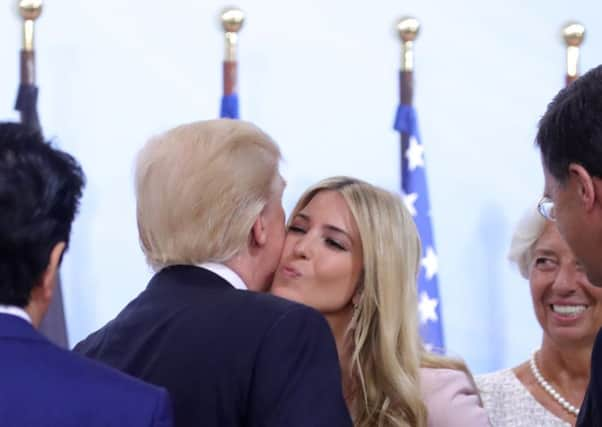Hannah McGill: Scions of celebrity should give us a leg up


Around the same time, I was reading a lot of impassioned opinions about the new film by Sofia Coppola, The Beguiled, which won her the Best Director title at this year’s Cannes Film Festival. I also heard an edition of Desert Island Discs featuring the choices of the modest and likable fashion designer Stella McCartney. And then there was the sight of that other fashion maven, Ivanka Trump, keeping her father’s seat warm at the G20 summit.
Now, no-one is saying that these young and young-ish people are not gifted and determined individuals in their own right. But just this random sampling illuminates one reason that our topmost tiers of culture and power offer such an inadequate representation of the diversity of our society: because having well-known, well-connected and well-off relatives really helps you get ahead. This might not be as blatant as President Trump simply shoving his daughter front and centre (while she touchingly claims to “stay out of politics”); nor need it even be a conscious process at all. Sir Paul and Lady Linda McCartney sent Stella to the local comprehensive, where she was known as Stella Martin. Eliot Sumner, musician daughter of Sting and Trudie Styler, insists that she takes no financial support from her family, and says her dad’s fame “hasn’t kicked open any doors for me”.
Advertisement
Hide AdAdvertisement
Hide AdBut maybe they didn’t need to be kicked, because they were already open. That’s the thing about privilege: for those mired in it, it’s hard to see. Stella McCartney had Kate Moss and Naomi Campbell modelling in her graduation catwalk show. Eliot Sumner has spoken, in between protestations of “feral” independence, of a childhood spent roaming the family estate, a first guitar acquired at the age of four, and a record contract scored at 17, around the same time she was dabbling in modelling for Burberry. Opportunities that would have happened along anyway, given talent and graft? Sure – maybe. But it doesn’t hurt, does it, if everyone you meet on your upward trajectory would like to be pals with your dad? Or if key industry contacts dominate the family Christmas card list?
Rachel Johnson, sister of Boris, describes in her book on editing toff journal The Lady a filial opportunity-swap she arranged with Lisa Armstrong, then the fashion editor of The Times. “I told Lisa I would give her daughter work experience if she had [Johnson’s daughter] Milly into the Times fashion department. One can see why everyone hates the middle classes so much – they divvy up the glittering prizes now even before university has already begun, in a sort of members’ enclosure to which only the privileged VIPs ever gain entry.” Whether or not you buy that clan being merely “middle class”, there’s something breathtakingly Johnson about this free admission of unjust advantage untempered by any misgiving or compulsion to redress the balance.
Successful children of the influential are understandably touchy about accusations of nepotism. As they see it, they’ve worked hard to follow their passions – and is it really fair to expect them to separate out genuine investment in their talents from greedy interest in their origins? Would any of us really be pure-hearted or self-punishing enough to refuse real career opportunities on the basis that they might not be wholly merit-driven, or would we take what we could get to get on? And as for the Johnsons and Armstrongs of this world – aren’t they just doing what any loving parent does, in trying to ensure that their kids get to fulfil their potential? It’s easy, but arguably unfair, to sneer. There’s also the argument that talent begets talent. Perhaps it has to be taken into account that charismatic and dynamic humans produce similarly gifted kids. And even given all that, advantages can’t guarantee success: Jakob Dylan and Sean Lennon stand as examples of the most starrily connected who failed to deliver, while several launches of Eliot Sumner, under various different names, haven’t yet made her a megastar.
Even the case of Ivanka Trump is complicated by the fact that the families of presidents have hitherto been granted positions of influence and responsibility, and have often been judged significant contributors to their fathers’ legacies. Arguably, Ivanka’s active role simply compensates for the fact that her stepmother Melania seemingly intends to do absolutely zip with the historically pivotal role of First Lady – and if both Hillary and Chelsea Clinton can acceptably build their careers and profiles on the basis of a presidency in the family, why shouldn’t at least one Trump?
A further complication applies specifically to UK critics of the culture of nepotism. How sneery can we really be about a Beckham here and a Huston there, when our own head of state is still determined by birthright alone?
It can even be a pleasant experience to note the continuity of tradition in a famous family – to recognise, for instance, some of the Sam Waterston’s features in the face of his actress daughter Katherine, or Ray Winstone’s in his offspring Jaime. And isn’t there the slightest possibility, in the cases, for instance, of Coppola, Trump and McCartney, that nepotism has usefully overridden the patriarchy, securing some talented woman the deserved chance to shine in male-dominated industries?
Perhaps it’s neither preventable nor all bad, then, for bloodlines to influence careers. These lucky many for whom such doors yawn open, however, should be wise enough not to attempt to conceal or deny the fact. And maybe where they do end up scoring influence of their own, it should be particularly encouraged that they give back by offering a hand up to people with whom they don’t share genes, surnames or rambling Wiltshire estates.